Our second four core Ryzen review will focus on the AMD Ryzen 5 1500X. We recently published benchmarks of the AMD Ryzen 5 1400, a lower clocked sibling. While the TDP remains the same at 65W, the $20 price bump in models gets you significantly more. First, you get a 300MHz clock boost to a 3.5GHz base and a 3.7GHz turbo clock speed. Second, you get a full 16MB of L3 cache, twice that of the Ryzen 5 1400. Finally, you get a higher-end cooling solution bumping up to the Wraith Spire. If you want to know one of the big reasons we were less than impressed with the Ryzen 5 1400, this CPU is a major reason. For $20 more the AMD Ryzen 5 1500X is a significantly better option. From what we understand, most hardware review sites did not receive samples of the Ryzen 5 1600, and as we compare the 1500x to our AMD Ryzen 5 1600 Linux benchmarks you are likely to see that the 1500X’s biggest competition sits $30 higher in the SKU stack.
Test Configuration
For our Ubuntu 14.04 with kernel 4.10.1 benchmarks, we standardized on a very simple platform.
- CPU: AMD Ryzen 5 1500X
- Motherboard: ASUS Prime B350-Plus
- RAM: 16GB (4 x 16GB) DDR4-2666
- Boot Media: Intel DC S3710 400GB
- Cooling: AMD Wraith Spire (Included)
- Operating System: Ubuntu 14.04 LTS with Kernel 4.10.1
We expect most 1500X users will opt for a low-end X370 motherboard or a B350 motherboard. The AMD B350 motherboards, such as the ASUS Prime B350-Plus we are using, provide enough capacity for a single GPU system with 1-2 SSDs. In the market today, most of the lower-end X370 motherboards such as the ASUS Prime X370-Pro we use in many of our systems tend to have more features and better options for multi-GPU support at a cost of around $60-80 more.
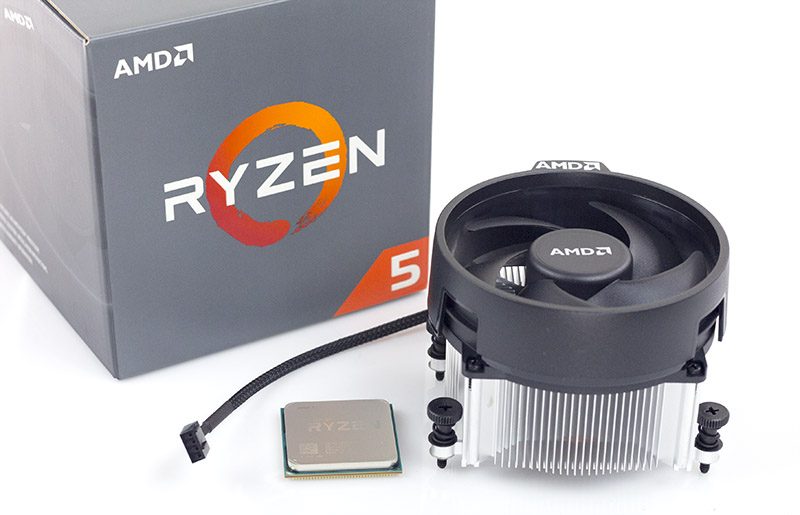
In the package, you will get the CPU along with an AMD Wraith Spire cooler. The Spire is a larger capacity unit than the Stealth we saw with the Ryzen 5 1400. The included Spire does not have the RGB LED lighting of the Spire RGB found bundled with the AMD Ryzen 7 1700. For most purposes, this is going to be good enough to use out-of-the-box for many users.
We recommend using Ryzen only with Linux kernels 4.10 and later. Ubuntu 17.04 will be out soon with kernel 4.10, however, if you want to use a Ubuntu LTS release here is the guide to stop constant crashing with Ubuntu and Ryzen. We linked the Ubuntu upgrade guide but if you are running Debian, RHEL, or CentOS 7 you will need to upgrade to a newer kernel ASAP. Here is the guide to stop the crashes in CentOS 7 by upgrading the kernel to 4.10.1 there.
Many of our readers need some sort of VMware support. Ryzen 5 like Ryzen 7 has significant issues in VMware ESXi 6.5. We did post a workaround involving a significant performance penalty. For now, we suggest using Windows 10 + VMware Workstation 12 Pro with Ryzen.
AMD Ryzen 5 1500X Linux Benchmarks
For our testing, we are using Linux-Bench scripts which help us see cross platform “least common denominator” results. We are using gcc due to its ubiquity as a default compiler. One can see details of each benchmark here. We are likely going to update the Linux-Bench in the near future with a few new tests as well as an even simpler to use/ faster revision, but for now, we are using the legacy version that now has over 100,000 test runs under its belt.
The item to remember here is that any benchmark we are publishing has had at least 10,000 profiling runs on a multitude of different architectures to ensure we get consistent results before we add it to our repertoire. Normally we go one step further and heat soak every machine at 100% load for 24 hours. On multi-node systems we even use a “sandwich” and controlled temperature and humidity to ensure systems are as close to real-world temperatures as possible. Due to the desktop nature of Ryzen chips, we are going to present our Linux kernel 4.10.1 based results all with 24-hour heat soak but with no adjoining systems.
Python Linux 4.4.2 Kernel Compile Benchmark
This is one of the most requested benchmarks for STH over the past few years. The task was simple, we have a standard configuration file, the Linux 4.4.2 kernel from kernel.org, and make with every thread in the system. We are expressing results in terms of complies per hour to make the results easier to read.
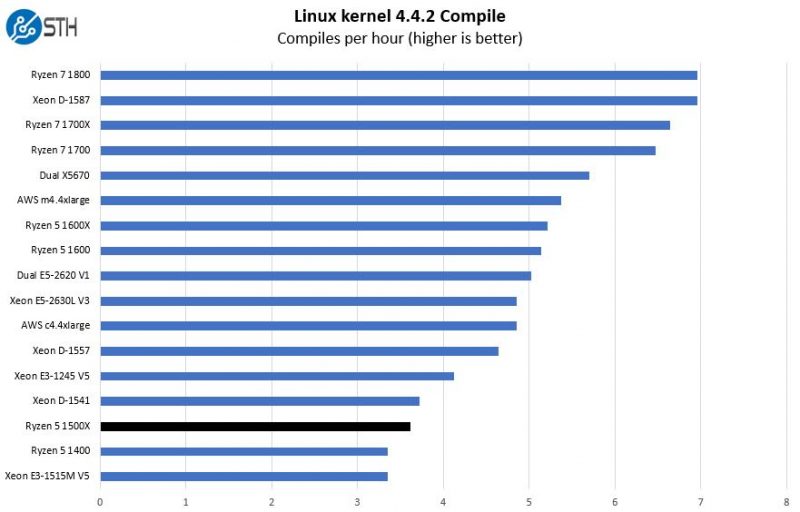
We wanted to point out that there are a few differences between our Ryzen 7 1700X results we published on launch day and the additional results here. Namely, we are using a different kernel that has many of the necessary patches required to make everything run smoothly. These are all running Kernel 4.10.1 which we have guides showing how to get working.
The two data points to watch for here are the Ryzen 5 1400 and the Ryzen 5 1600. There is an appreciable performance benefit over the Ryzen 5 1400 that as we will see warrants an additional $20 outlay. The big competition we feel is from the Ryzen 5 1600 is only another $30. If your work involves a lot of software compiling, then we suggest that $30 upgrade over the 1500X is more than worth it.
c-ray 1.1 Performance
We have been using c-ray for our performance testing for years now. It is a ray tracing benchmark that is extremely popular to show differences in processors under multi-threaded workloads.
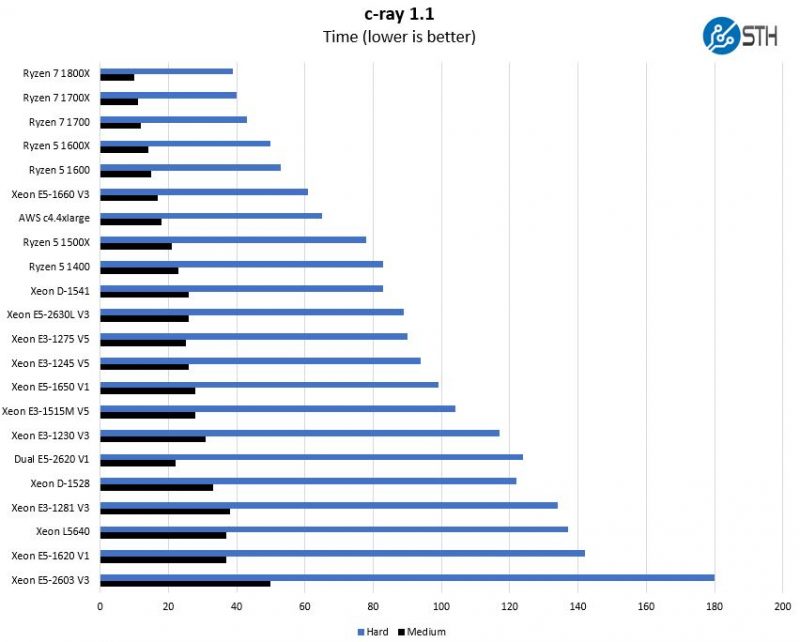
The AMD Ryzen 5 1500X is the highest performance 4 core/ 8 thread launch model. While c-ray is a great benchmark for Ryzen, is sill favors more cores. Here we can see the 4C /8T chip perform very well against the Skylake generation Intel E3-1200 V5 chips. We will have Kaby Lake Xeon E3-1200 V6 benchmarks soon for additional comparison points.
7-zip Compression Performance
7-zip is a widely used compression/ decompression program that works cross platform. We started using the program during our early days with Windows testing. It is now part of Linux-Bench.
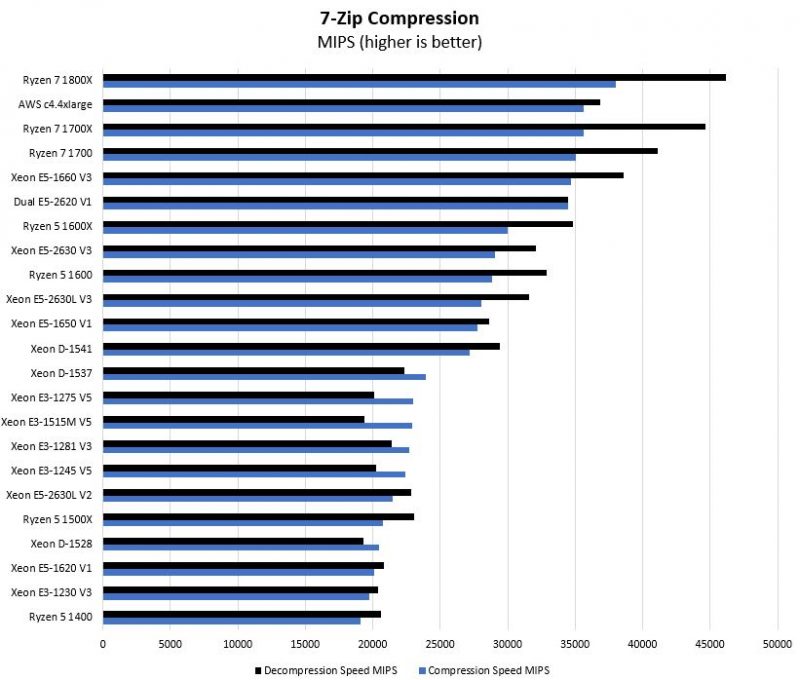
In the compression tests, again we see solid results over the Ryzen 5 1400. The major performance bump comes with more cores so if you have a lot of compression tasks, get higher core Ryzen models. The Ryzen 7 1700 is price $140 higher but offers a bit less than twice the performance.
NAMD Performance
NAMD is a molecular modeling benchmark developed by the Theoretical and Computational Biophysics Group in the Beckman Institute for Advanced Science and Technology at the University of Illinois at Urbana-Champaign. More information on the benchmark can be found here. We may replace this or augment with GROMACS in the next-generation Linux-Bench as that test is currently running through regressions.
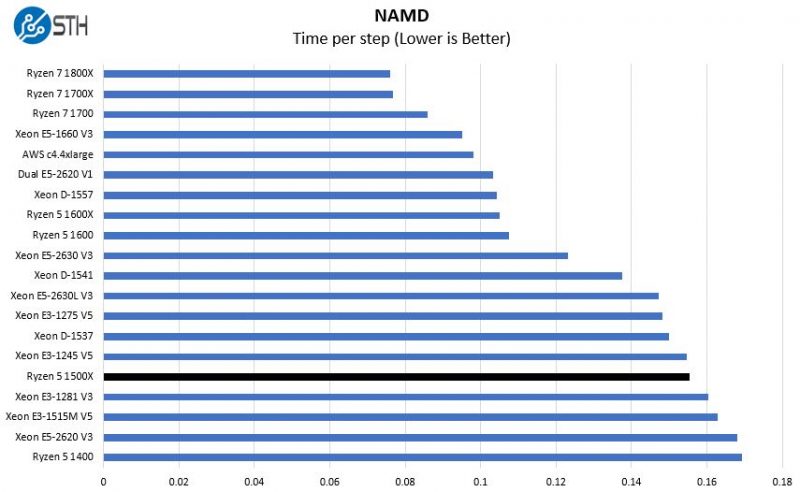
The Intel Xeon E3-1245 V5 is a 4 core/ 8 thread chip from 2015 that cost $100 more, albeit with an integrated GPU. About 18 months later, and sans GPU, the AMD Ryzen 5 1500X offers similar performance. Of course, with these types of simulations, we suggest getting more cores if possible.
Sysbench CPU test
Sysbench is another one of those widely used Linux benchmarks. We specifically are using the CPU test, not the OLTP test that we use for some storage testing.
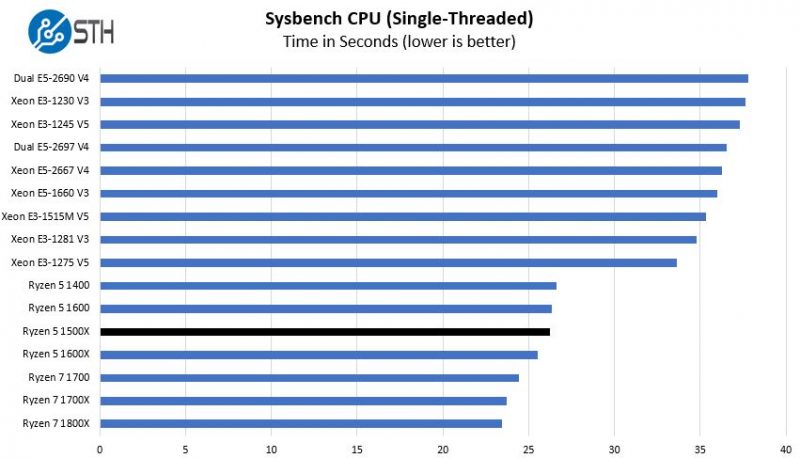
In Sysbench, the Ryzen 5 1500X consistently performed just a bit better than the Ryzen 5 1600. Again, Sysbench runs extremely well on the AMD Zen based platforms.
OpenSSL Performance
OpenSSL is widely used to secure communications between servers. This is an important protocol in many server stacks. We first look at our sign tests:
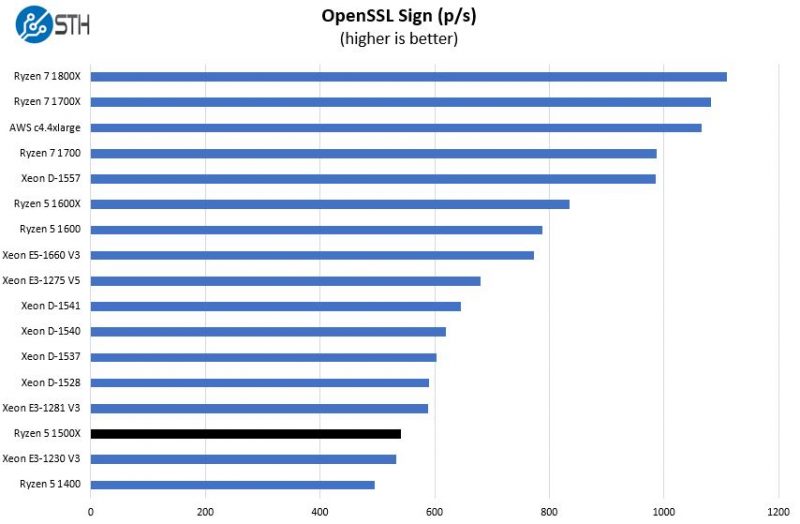
And our verify tests:
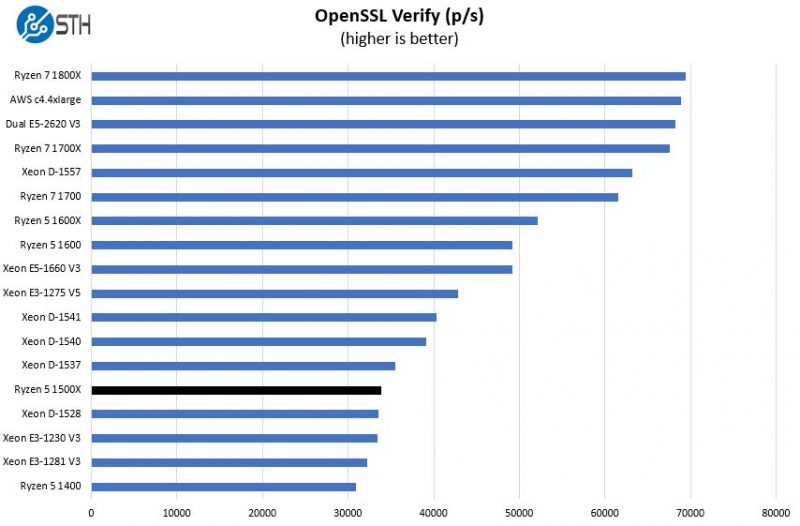
Here you can see the nice difference between the Ryzen 5 1400 to Ryzen 5 1500X to Ryzen 5 1600 continuum. $20 from 1400 to 1500X gets you a 10% or so bump whereas the next $30 gets you another 40%.
UnixBench Dhrystone 2 and Whetstone Benchmarks
One of our longest running tests is the venerable UnixBench 5.1.3 Dhrystone 2 and Whetstone results. They are certainly aging, however, we constantly get requests for them, and many angry notes when we leave them out. For example on our original AMD Ryzen 7 1700X review where UnixBench was crashing due to the kernel version, we were using we left the results out and received many e-mails asking about them. UnixBench is widely used so it is a good comparison point.
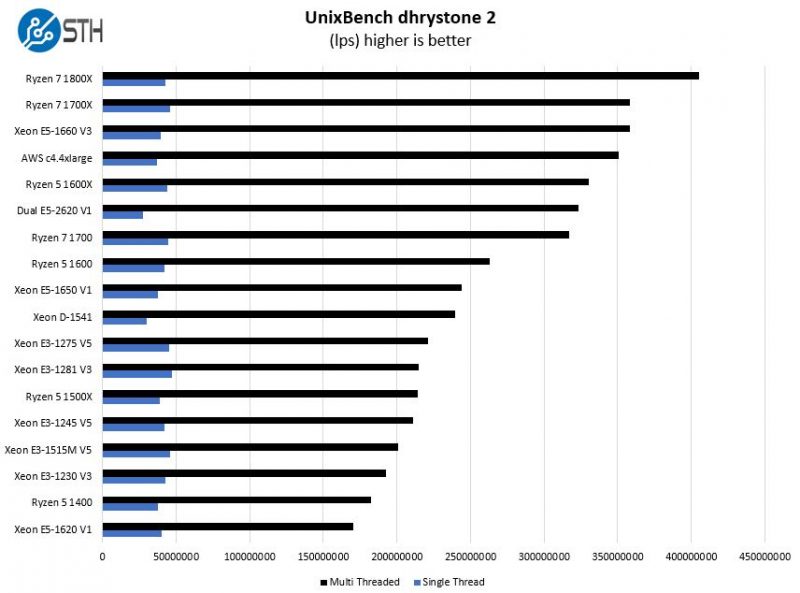
The Ryzen 5 1500X puts up an excellent showing here.
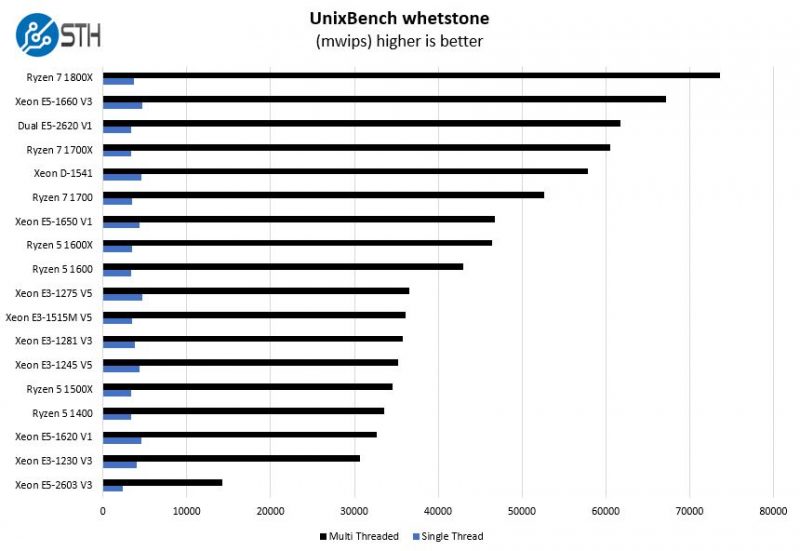
If you compare the Ryzen 5 1500X to the Xeon E5-1620 V1 from five years ago at $295, there is a noticeable bump in speed although perhaps not enough to upgrade.
Final Words
Our recommendation for a 4 core / 8 thread chip in the Ryzen 5 line-up is squarely with the Ryzen 5 1500X. With that said, one can easily see why AMD did not sample many hardware review sites with the AMD Ryzen 5 1400 and Ryzen 5 1600. We love the huge L3 cache and have some fun test cases (e.g. Monero Mining) where the cache helps the Ryzen 5 1500X achieve a 50% performance improvement over the Ryzen 5 1400. The biggest question in our minds is that if you are spending upwards of $500 on the rest of the system, does it not make sense to get the Ryzen 5 1600 instead? That is a major reason we believe most review sites were not offered samples of the Ryzen 5 1600 chips we have already benchmarked. The value proposition of the Ryzen 5 1500X against Intel 4C / 8T is good. The value proposition against the Ryzen 5 1600 and Ryzen 7 1700 is significantly murkier.

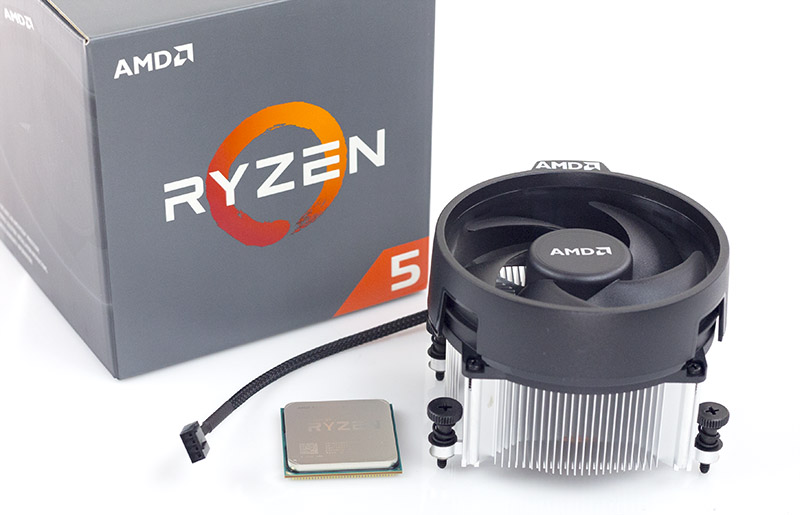
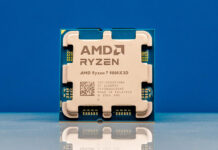


What happened to unix-bench results? I want to see your results up there!